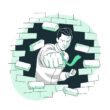Understanding the distinction between skills and talent is crucial for staying ahead of the curve. Let’s embark on a journey to demystify these terms and explore practical ways to leverage them effectively.
Skills – The Building Blocks:
Skills are the practical and learnable proficiencies acquired through education, training, and experience. Think of them as the bricks that construct the foundation of your professional toolkit. Examples include coding, data analysis, writing, or graphic design. These are abilities you can enhance through practice and dedication.
Talent – The Natural Flair:
On the flip side, talent is an inherent, natural aptitude for certain activities. It’s the predisposition that makes some individuals naturally excel in specific areas. For instance, someone might have a talent for public speaking, artistic expression, or strategic thinking. Talent often provides a head start, but it requires honing to reach its full potential.

Getting Ahead:
- Identify Your Skills and Nurture Them:
- Example: If you have a skill for data analysis, take online courses to stay updated on the latest tools and techniques.
- Discover Your Talents and Polish Them:
- Example: If you have a talent for connecting with people, explore roles that allow you to leverage this strength, such as sales or community management.
- Blend Skills and Talent for Synergy:
- Example: A talented graphic designer can enhance their skill set by learning the latest design software, creating a powerful combination.
- Embrace a Growth Mindset:
- Example: Even if you’re naturally talented in a certain area, adopting a growth mindset encourages continuous learning and improvement.
- Seek Feedback and Iterate:
- Example: A skillful writer can evolve by seeking constructive feedback, refining their style, and adapting to different writing formats.
- Adapt to Industry Trends:
- Example: In the rapidly changing tech industry, continuously updating coding skills is crucial to remain competitive.
- Build a Diverse Skill Set:
- Example: An effective project manager not only excels in organizational skills but also hones leadership, communication, and problem-solving abilities.
Conclusion:
In the dance of skills and talent, success emerges from their harmonious partnership. Recognizing the unique strengths you bring to the table, whether through skills or talent, empowers you to navigate the professional landscape strategically. By blending a growth mindset with a commitment to honing both skills and talents, you position yourself not only to keep up with the curve but to set new standards in your field. Remember, it’s not a question of skills versus talent; it’s the synergy between them that propels you toward unparalleled success.

















